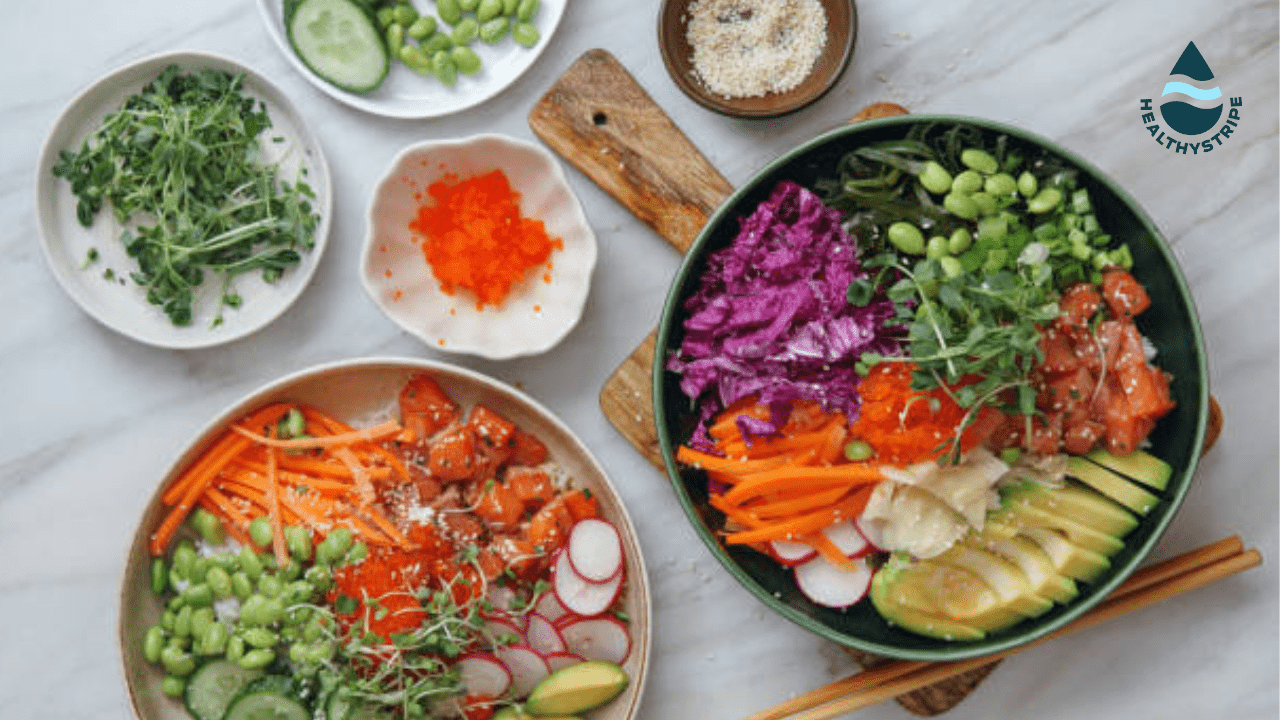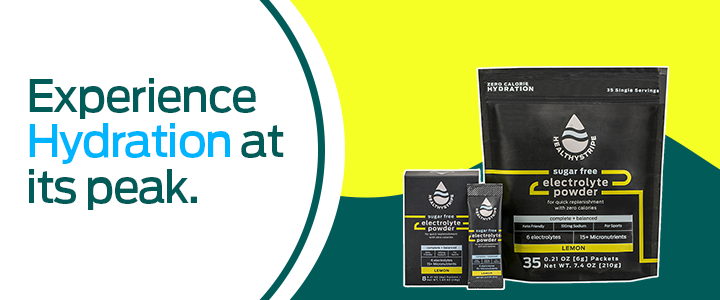Top 25 Anti-Inflammatory Foods and Recipes To Include In Your Diet
Healthystripe Editorial Team
The Healthystripe Editorial Team is a diverse and experienced group of medical experts, doctors, and healthcare professionals dedicated to providing reliable, evidence-based information to our readers.Click Here to read more

Inflammation is common in various health conditions, and certain foods have been associated with aggravating it. To mitigate inflammation, individuals are advised to reduce their intake of processed foods, alcohol, and red meat, while incorporating more anti-inflammatory foods into their diet.
Some people suffer from a medical condition where their immune system doesn’t function properly, leading to persistent or recurrent low-level inflammation. This chronic inflammation is linked to several diseases, including psoriasis, rheumatoid arthritis, and asthma. Making appropriate dietary choices can play a role in managing the symptoms of these conditions.
An effective approach to combat inflammation is adopting an anti-inflammatory diet plan. This diet emphasizes consuming fruits, vegetables, foods rich in omega-3 fatty acids, whole grains, lean protein, healthy fats, and spices. Simultaneously, it discourages or restricts the intake of processed foods, red meats, and alcohol.
It’s important to note that the anti-inflammatory diet is not rigid but a lifestyle promoting overall health. The Mediterranean diet and the DASH diet are two instances of anti-inflammatory diets. Individuals might have the option to control inflammation all the more successfully and work on their overall health by sticking to these eating regimens.
Top 25 Anti-Inflammatory Foods To Eat
Inflammation a Characteristic Reaction by Our Resistant Framework Inflammation is a certified reaction by our safe framework to battle off contaminations and advance recuperation. In any case, chronic inflammation can prompt different health issues, like heart illness, diabetes, and even disease. Beneficially, certain foods have anti-inflammatory properties that can assist with relieving chronic inflammation. Including these things in your diet could prompt better health overall. In this article, we’ll examine the top 25 foods that are anti-inflammatory that you ought to ponder including in the food you eat consistently.
1. Berries – Berries like strawberries, blueberries, raspberries, and blackberries are plentiful in antioxidants and mixtures that guide inflammation reduction. Their elevated degrees of anthocyanins are particularly powerful in battling oxidative pressure.
2. Fatty Fish – Fatty fish like salmon, mackerel, sardines, and trout are rich in omega-3 fatty acids, known for their strong anti-inflammatory properties. These fats can assist with lessening the development of inflammatory cytokines.
3. Turmeric – Turmeric contains curcumin, a viable compound known for its antioxidant and anti-inflammatory effects. Integrating turmeric into your meals might be useful to lower levels in chronic inflammation.
4. Leafy Greens – Leafy greens like spinach, kale, and Swiss chard are loaded with nutrients, minerals and antioxidants. They offer imperative nutrients that advance by and large prosperity and battle against inflammation.
5. Green Tea – Green tea is rich in catechins, which are antioxidants related with diminished inflammation levels. Normal admission of green tea can add to a more helpful inflammatory response.
6. Extra Virgin Olive Oil – Extra virgin olive oil a Rich Source of Monounsaturated Fats and Oleocanthal with Anti-Inflammatory Effects Like Ibuprofen.
7. Nuts – Nuts, including almonds, pecans, and pistachios, contain plentiful healthy fats and antioxidants. They can diminish inflammation while improving heart health.
8. Garlic – Garlic contains allicin, a component with strong anti-inflammatory and insusceptible upgrading effects. Including fresh garlic in the food you eat can have a gainful impact on inflammation levels.
9. Ginger – Ginger contains gingerol, a mix that holds solid anti-inflammatory effects. Diminishing Inflammation with Ginger.
10. Whole Grains – Whole grain foods like earthy-colored rice, quinoa, and oats are rich in fiber and different nutrients that help lower inflammation in the human body.
11. Dark Chocolate – Dark chocolate with a high cocoa content incorporates flavonoids that have been connected to diminished inflammation. Consumed with some restraint, it tends to be a tasty method for advancing your prosperity.
12. Tomatoes – Tomatoes a Great Source of Lycopene, an Antioxidant with Anti-Inflammatory Properties Cooking tomatoes: Upgrading the bioavailability of lycopene.
13. Beets – Beets comprise betalains, substances with anti-inflammatory and antioxidant effects. They can uphold a healthier inflammatory response in the body.
14. Avocado – Avocado is a natural product that is rich in monounsaturated fats and antioxidants. These nutrients are advantageous for heart health and can likewise assist with decreasing inflammation.
15. Peppers – Bell peppers, especially the exotic ones, contain nutrients, minerals, and antioxidants that have anti-inflammatory properties.
16. Broccoli – Broccoli is loaded with sulforaphane, a compound prestigious for its anti-inflammatory and anti-malignant growth credits.
17. Onions – Onions contain quercetin, an antioxidant that have been shown to diminish inflammation and unfavorably susceptible reactions in the body.
18. Pineapple – Pineapple, Bromelain, a catalyst with anti-inflammatory effects, is tracked down in pineapple. It might help with diminishing enlarging and inflammation, particularly in conditions like joint pain.
19. Chia Seeds – Chia seeds are rich in omega-3 fatty acids and fiber, which are gainful for decreasing inflammation and working on stomach-related health.
20. Mushrooms – Certain mushrooms, like shiitake and maitake, have intensities that have the capacity to manage the resistant framework and abatement inflammation.
21. Flaxseeds – These are Rich in Alpha-Linolenic Corrosive (ALA) for Lowering Inflammation
22. Oranges – Oranges and other citrus organic products: A source of L-ascorbic acid and antioxidants for decreasing inflammation and helping the safe framework.
23. Carrots – Carrots are rich in beta-carotene and different antioxidants, which have anti-inflammatory properties.
24. Lentils – A Nutritious Plant-Based Protein and Fiber Source for Inflammation Reduction and Stomach Health Backing.
25. Sweet Potatoes – Sweet potatoes are loaded with fundamental nutrients and useful mixtures that add to diminishing inflammation and support by and large prosperity.
Diet Recipes Of Anti-Inflammatory Food
With these five recipes for an anti-inflammatory diet, discover a world of delicious flavors that promote good health. These recipes delight your taste buds while also supporting your body’s natural anti-inflammatory defenses because they are packed with nutrient-rich ingredients. Accept a gastronomic adventure that combines culinary pleasure with advantages for improving your health.
Recipe 1: High-Fiber Oat Porridge with Berries
This sustaining oat porridge is loaded with prebiotics, antioxidants, and fiber, all of which back stomach health and general prosperity.
Oats are rich in beta-glucans, a prebiotic fiber that supports beneficial gut bacteria like Bifidobacterium. These bacteria help reduce inflammation related to diabetes and obesity.
By incorporating berries, especially blueberries, with their anti-inflammatory anthocyanins, we further boost the antioxidant content of this delicious meal.
Consider using traditional rolled or steel-cut oats over quick oats for an added fiber punch.
Ingredients:
- Steel-cut oats
- Fresh or frozen berries (blueberries, strawberries, raspberries, or a combination)
- Almonds
- Unsweetened kefir
- Maple syrup
Recipe 2: Grilled Sauerkraut, Hummus, and Avocado Sandwich
Indulge in a delightful and anti-inflammatory vegetarian twist on the Reuben sandwich, packed with gut-friendly probiotics and nourishing ingredients.
Sauerkraut offers probiotics that promote a healthy gut microbiome, which can positively affect inflammation. It is one of the best anti-inflammatory foods for arthritis.
This grilled sandwich is a healthier alternative to the classic Reuben, with reduced salt and calories. Hummus and avocado replace meat and sauce, providing a creamy texture and protein.
Ingredients:
- Pumpernickel bread
- Butter or buttery spread
- Garlic-flavoured hummus
- Sauerkraut
- Avocado
Recipe 3: Omega-3 Rich Salmon with Zucchini Pasta and Pesto
Enjoy a light yet satisfying gluten-free alternative to pasta with this delightful salmon and zucchini dish abundant in omega-3 fatty acids.
Zucchini serves as a fantastic pasta replacement, and you can create zucchini noodles with a potato peeler for a linguine-like texture.
The recipe features omega-3-rich ingredients like salmon and avocado. Feel free to swap salmon with other fatty fish, such as tuna or mackerel.
Ingredients:
- Salmon (or another fatty fish of choice)
- Zucchini
- Avocado
- Parmesan
- Pesto
- Lemon
Recipe 4: Hearty Lentil and Chicken Soup with Sweet Potato
This filling lentil and chicken soup provides abundant fiber, protein, and essential nutrients, thanks to the wholesome sweet potatoes and lentils.
Sweet potatoes are rich in vitamins A, B, and C, calcium, iron, and valuable antioxidants.
You can use leftover or store-bought roast chicken to prepare this delicious and nutritious soup for a time-saving option.
Ingredients:
- Rotisserie chicken (or roast chicken leftovers)
- Sweet potatoes
- French lentils
- Celery stalks
- Garlic
- Escarole
- Dill
- Lemon
Recipe 5: Spinach and Feta Frittata
A spinach and feta frittata is a wonderful recipe that offers a combination of green, leafy vegetables like spinach and broccoli, rich in quercetin and coenzyme Q10, two useful polyphenols.
Coenzyme Q10 has been connected to decreasing inflammation related to metabolic infections like RA, various sclerosis, and diabetes.
Frittatas are known for their simplicity and speedy readiness, giving an astounding open door to culinary trial and error with different flavors. One can supplement this dish with a side serving of mixed greens for added health benefits.
To set up this flavorful frittata, you’ll require a couple of essential fixings, including
- olive oil
- garlic
- brown onion
- baby spinach
- eggs
- crushed feta cheddar.
Benefits And Risks Of Anti- Inflammatory Foods
As indicated by different solid sources, an anti-inflammatory diet, standard activity, and sufficient rest can prompt numerous health benefits.
- One of the critical benefits of embracing an anti-inflammatory diet is its capability to reduce side effects related to conditions like joint pain, inflammatory bowel disease, lupus, and other immune system problems.
- On top of that, this dietary methodology can likewise be significant in lessening the risk of creating heart disease, diabetes, depression, obesity, malignant growth, and other diseases. Addressing inflammation within the body may help safeguard against various chronic and debilitating health conditions.
- Also, studies have shown that an anti-inflammatory diet vegetarian or non-vegetarian, is linked to decreased inflammatory markers in the bloodstream. This reduction in inflammation is vital as chronic inflammation has been associated with several health problems and may contribute to the development of various diseases.
- Furthermore, adhering to this diet has been associated with improved blood sugar, cholesterol, and triglyceride levels. This, in turn, can positively impact overall cardiovascular health and reduce the risk of heart-related issues.
- Beyond physical health benefits, individuals following an anti-inflammatory diet have reported experiencing better energy levels and an uplifted mood. This improved emotional well-being is believed to result from the diet’s impact on hormonal balance and neurotransmitter function.
The anti-inflammatory diet is generally considered a healthy and balanced way of eating, focusing on consuming foods that can reduce inflammation. However, like any dietary plan, there are some potential risks and considerations to keep in mind:
- Nutrient Deficiencies: Depending on the specific food choices and restrictions made in the anti-inflammatory diet, there is a possibility of not getting enough essential nutrients. For instance, eliminating certain food groups like dairy, grains, or meats may miss important vitamins, minerals, and proteins.
- Imbalanced Diet: Relying heavily on certain foods and neglecting others can lead to an imbalanced diet. Variety is essential to ensure you get a broad range of nutrients and maintain overall health.
- Caloric Intake: If you are not careful about portion sizes and overall caloric intake, you may unintentionally consume more or fewer calories than your body needs, leading to weight gain or loss.
- Social And Practical Challenges: The anti-inflammatory diet might be trying to continue in social circumstances, cafés, or while voyaging, as it might restrict food decisions and make hardships in keeping up with the diet reliably.
- Psychological Impact: Severe dietary limitations can here and there prompt sensations of hardship and stress, particularly on the off chance that you have to remove most loved foods or whole food gatherings.
- Lack Of Scientific Evidence: While there is some evidence supporting the anti-inflammatory properties of certain foods, the overall effectiveness of the anti-inflammatory diet is still an area of ongoing research. Claims about the diet’s ability to prevent or treat specific diseases may not be fully substantiated.
- Potential Allergies Or Sensitivities: If you are not accustomed to some of the foods promoted in the anti-inflammatory diet, you may develop allergies or sensitivities.
It is essential to remember that every person’s nutritional needs and health conditions are unique. Before starting any new diet, especially one that involves significant changes, it’s advisable to consult a registered dietitian or healthcare professional who can assess your individual needs and provide personalized recommendations.
Foods To Avoid For Inflammation Decrease
To support your overall health and reduce inflammation, focus on incorporating nutritious anti-inflammatory foods into your diet while limiting the consumption of foods known to promote inflammation.
Certain food items tend to increase the inflammation markers such as CRP in the blood. Additionally, sugary beverages and refined carbs can also contribute to inflammation.
Examples of foods for inflammation include processed food such as fast food and potato chips, white bread, crackers, biscuits, mozzarella sticks, fried chicken, fries, sweet tea, etc.
While it’s acceptable to enjoy these foods occasionally, strive to maintain a well-balanced diet based on whole foods, including plenty of fruits and vegetables. Opt for minimally processed options whenever possible to promote better health.
Conclusion
Consistent low-level inflammation can contribute to the development of diseases. Aim to incorporate diverse delightful, antioxidant-rich foods into your diet to promote a healthy lifestyle and keep inflammation in check. Choose minimally processed foods that exhibit vibrant colors, as they are abundant in essential anti-inflammatory nutrients.
Add peppers, dark chocolate, fish, and extra virgin olive oil to your meals, as they effectively combat inflammation and reduce the likelihood of falling sick. Embracing these dietary choices mentioned above will enable you to take proactive steps toward maintaining your well-being and reducing the risk of various health issues.
Is rice an anti-inflammatory food?
While plain rice is not an anti-inflammatory food, varieties like brown rice offer some benefits due to its fiber content. However, to create a more comprehensive anti-inflammatory diet, it’s best to include a wide range of anti-inflammatory foods as a part of a balanced and varied eating plan.
What is the healthiest anti-inflammatory food?
Foods rich in omega-3 fatty acids, such as salmon, chia seeds, and walnuts, are among the healthiest anti-inflammatory options. They help combat inflammation and support overall well-being.
Which anti-inflammatory food is best?
The best anti-inflammatory food varies depending on individual needs and preferences. Generally, a diverse diet, including fruits, vegetables, nuts, fatty fish, and whole grains, provides a broad range of anti-inflammatory nutrients.
What is the strongest natural anti-inflammatory food?
Turmeric is considered one of the strongest natural anti-inflammatory foods. Its active compound, curcumin, has powerful anti-inflammatory effects that can help reduce inflammation.
Are bananas anti-inflammatory?
Bananas have some anti-inflammatory properties due to their high content of vitamins, minerals, and antioxidants like vitamin C and dopamine. However, they are not the most potent anti-inflammatory food available.









